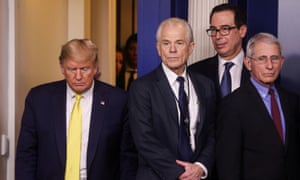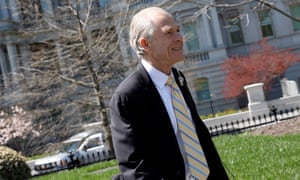Green activist turned China hawk shares president’s brittle traits and wrote books quoting expert who turned out to be fictitious version of himself
- Coronavirus – latest updates
- See all our coronavirus coverage

Photograph: Jonathan Ernst/Reuters
The rise of Peter Navarro – the man put in charge of marshalling emergency US production of medical equipment in the midst of a pandemic – is in many ways a classic story of the Trump era.
The 70-year-old White House trade adviser was first recruited by Trump because he wrote a string of books about the Chinese strategic threat – one called Death by China – despite having spent almost no time in the country and having no grasp of the language.
Five of Navarro’s books cited a China hand with a particularly pithy turn of phrase called Ron Vara, who turned out not to exist. The name is an anagram of Navarro and the imaginary expert operated as an alter ego, confirming the author’s views.
Navarro made headlines in the past week by challenging Dr Anthony Fauci – the nation’s leading immunologist and the public face of the US scientific community’s race to contain Covid-19 – in a showdown in the White House situation room over the merits of an experimental drug.
When asked later why he thought he was qualified to start recommending pharmaceuticals to the nation, Navarro replied: “My qualifications in terms of looking at the science is that I’m a social scientist. I have a PhD. And I understand how to read statistical studies, whether it’s in medicine, the law, economics or whatever.”
People who have worked closely with Navarro agree he is undoubtedly bright. He holds a PhD in economics from Harvard. But there is nothing in his career to date that suggests he has the credentials or experience to manage the state intervention necessary to steer US industry towards producing the masks, gowns, ventilators and other life-saving supplies the country will need over the course of this pandemic.
Before coming to the White House, Navarro was a west coast academic economist with views on trade far outside the American mainstream and a failed political career behind him, have lost five elections and won none in his adoptive home town of San Diego.
His former campaign adviser, Larry Remer, said: “I wouldn’t trust him to go out to get lunch and come back with everybody’s sandwich and drink order correctly. I don’t know how he could be put in charge of logistics.
“On one level it’s amusing but on another level, it’s really dangerous,” added Remer, a San Diego political consultant.
Navarro’s appearance in the Trump camp during the 2016 presidential campaign came as a shock to those who knew him from his days in San Diego politics. He had started out as a registered Republican but became an anti-growth, environmentalist independent, then a Democratic candidate for Congress in 1996, promoted energetically but unsuccessfully by Hillary Clinton.
Navarro came closest to victory in 1992 when he emerged as the surprise contender to be San Diego mayor, taking on the city’s entrenched Republican establishment. He stood as an independent, with a working-class background, determined to stand up for the little guy in the face of rampant development. He called his movement Plan (Prevent Los Angelization Now) and he appeared to have a good chance of winning going into a final television debate a couple of days before the vote.

Towards the end of the debate the Republican candidate, Susan Golding, became emotional as she regretted the bruising nature of the campaign, in which the candidates had exchanged multiple slurs. Navarro misjudged the moment, accusing Golding of acting. He came across as cynical and unfeeling, and lost the race at the final hurdle.
“There’s something about the process that really brings out your essence,” Remer said. “And in this case it brought out Peter’s essence, which is that he has no people skills at all, and he has no empathy for other people.”
The personality problem got worse with each defeat, according to Navarro’s former spokeswoman, Lisa Ross, who worked with him on four campaigns.
“As the years went on and as he kept losing campaign after campaign, he became more and more brittle, more and more confrontational, and ended up … alienating just about everyone,” Ross said. “Peter was not a nice person at the end of the day … He can really get in your face.”
Ross said she watched Navarro’s extraordinary rise in Trump’s world with open-mouthed astonishment.
“He was the guy who was waving his arms in front of the bulldozer, so it was surprising when he went to work for the biggest bulldozer in the country,” she said, speculating it was his personality that drew Navarro into such close orbit of the president.
“It occurred to me that really Peter and Trump are the same kind of animal. They’re very media savvy but very brittle,” Ross said. “Peter can be a real bully and maybe that’s why Trump picked him. He wanted a bully to do the job.”
Navarro’s rollicking 1998 memoir, San Diego Confidential, displays some of the bravado that appears to have attracted Trump, who is said to refer to him as “my Peter”.
In the book Navarro acknowledged his reputation as “the cruelest and meanest son-of-a-bitch that ever ran for office in San Diego”, adding: “I don’t have any concern at all about making stuff up about my opponent that isn’t exactly true – I know that bastard running against me doesn’t have any scruples either.”
As well as echoing some of Trump’s own traits, Navarro has also shown, on occasion, the gift of prescience. His tirades against China and free trade anticipated the rhetoric that helped Trump win the presidency. In the first two years of the administration, though often marginalised by more powerful, pro-trade officials, he has emerged triumphant long after they have gone.
“He is extraordinarily influential in the White House and whether you like him or not, whether you agree with his politics he caught on early with Donald Trump,” said Walter Lohman, the director of Asian studies at the Heritage Foundation. “He sort of scratches an itch that Donald Trump has.”
Navarro was also vindicated in his dire warnings about the threat of Covid-19, sending a memo to the president in late January with an estimate that it could kill more than half a million Americans and cost close to $6tn. Trump has said he has no recollection of seeing the memo but the White House Cassandra has since emerged looking adept by comparison to the blithe counsel of treasury secretary, Steven Mnuchin, and the president’s son-in-law, Jared Kushner.
Navarro, the environmental activist turned China hawk, now has one of the most important jobs in the country as the coronavirus pandemic strengthen its grip. He has to save tens of thousands of lives in the face of woefully inadequate preparation by his own administration. He is equipped with little relevant experience and few allies, but with a fierce confidence in his own convictions.



